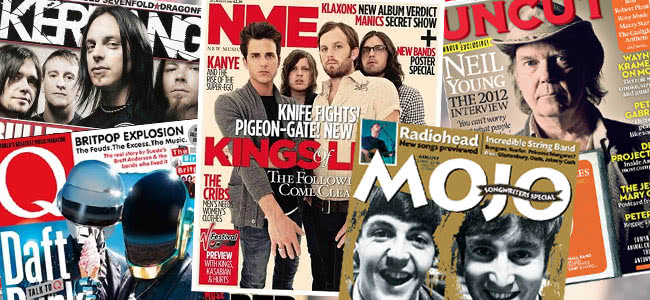In another pertinent sign of the times, it looks like print media may be going the way of CDs with figures revealing that some of the world’s longest-running music publications are experiencing significant drops in circulation.
It’s something that’s already been made clear here in Australia, with the discontinuation of a number of street press outlets and print publications last year as audiences begin to shift online, but now it seems that even major historic publications in music-savvy Great Britain are falling victim to current cultural trends.
The legendary New Musical Express, better known as NME, has seen its circulation drop by 13.2% in the first six months of 2013 compared to the same period of last year, as MusicWeek reports, which fell from an average 23,049 copies sold per week at the end of December 2012 – capping NME‘s 60th Anniversary – to 20,011 weekly copies by the end of June 2013 a mere sliver when compared to the 60 million population of the UK.
Its not an isolated drop either, with NME‘s publisher IPC media also struggling with the circulation of its other music mag, Uncut, which also experienced a drop of 8.8%, from an average weekly figure of 62,361 at the end of December 2012 to 56,894 at the end of June 2013; a drop of 9.7% in terms of year-on-year.
Rival UK publisher, Bauer Media – which prints long-running publications Q Magazine, Mojo, and hard rock bible Kerrang! – is also suffering. Music Week reports that Mojo and Q saw their readership drop by 5.2% and 4.1% respectively, while Kerrang! fared slightly better with a 2.5% drop in its circulation, going from an average 38,556 copies from December 2012 to 37,603 copies in June this year, a 6.5% year-on-year drop. NME has seen its circulation drop by 13.2% in the first six months of 2013 compared to the same period of last year.
Q‘s 4.1% decline meant for a drop from 61,485 to 58,980, and Mojo from 83,676, to 79.345, in the same tracking period. Bauer Media Chief Executive Paul Keenan said that the decline was just part of “a wider picture that makes up a brand’s reach and influence.” Adding that, “our focus is all about building valuable audience reach through delivering content wherever, whenever and however consumers want it.”
Namely, in the music magazines’ online presence through their respective websites – qthemusic.com, Mojo4Music.com, and Kerrang – while each magazine also hosts annual music awards to extend their brand. The same can be said for NME, which obviously also has an online presence, annual awards, and mobile and tablet apps.
Meanwhile over in the US, the influential Rolling Stone has a circulation of 1,473,497 closing June 2013 according to figures from the Alliance For Audited Media. The 1.47 million figure means the magazine has been selling more steadily than most in the last six years, which is slightly above its 1.45 million sales of 2007 and a slight dip of 1.48 million from 2011, as CNN points out, with 95% of that circulation figure coming from subscriptions, while the remaining 5% comes from individual sales from newsagents and vendors.
Interestingly, the controversial August edition of Rolling Stone that was widely panned for glorifying the Boston Bomber on its cover actually worked in favour for the magazine. Despite some retailers boycotting the issue in protest amongst a swell of community backlash, including a biting letter of damnation from the Mayor of Boston, the move didn’t hurt sales but instead boosted them. With Ad Week reporting that the Boston Bomber issue was a hit at newsstands, while over in the UK sales in fact doubled, according to The Daily Mail.
Meanwhile figures for the Australian edition of Rolling Stone, coincidentally published by Bauer Media’s Australian arm, are not available for the first half of 2013 from the Alliance For Audited Media, but there are already enough signals to suggest that print media is suffering Down Under. Last year alone saw a significant death toll; in June Brisbane street press Rave ceased operations after 21 years of publication, then regional music press Reverb shut up shop under mounting debts.
This year has fared no better, with The Music Network announcing ‘print is dead’ while ceasing its long running music publication then came the shock news that staff of Triple J Magazine were made redundant as its publisher, News Custom Publishing – part of the News Limited group – decided to ‘re-centralise’ to its Sydney headquarters, leaving the national youth broadcaster to put together the magazine itself as it moves to annual editions of Triple J Magazine.
All sobering indications that most music fans no longer leaf through the pages of their favourite mag to get their fix but are instead rifling through bookmarks with their mouse and keyboard.




































